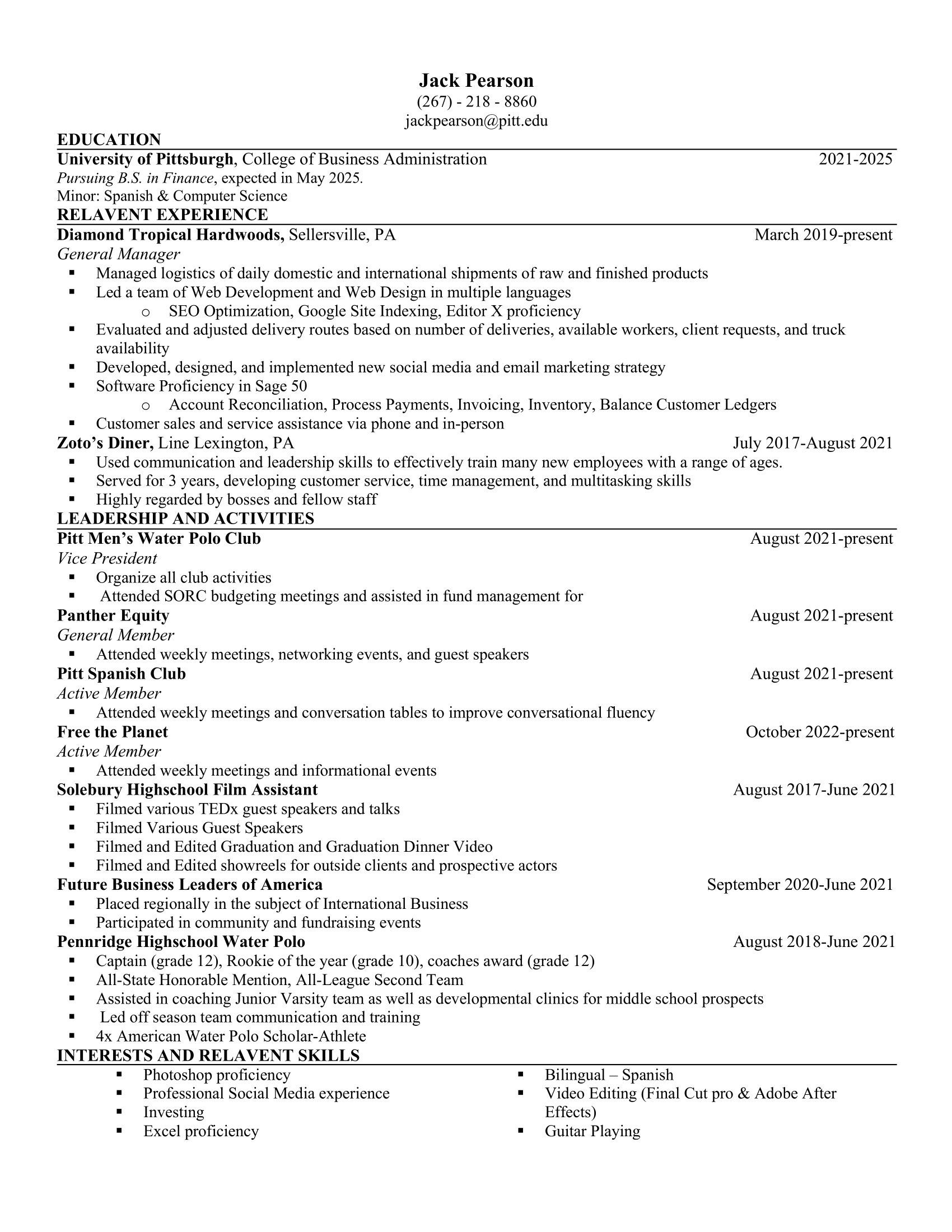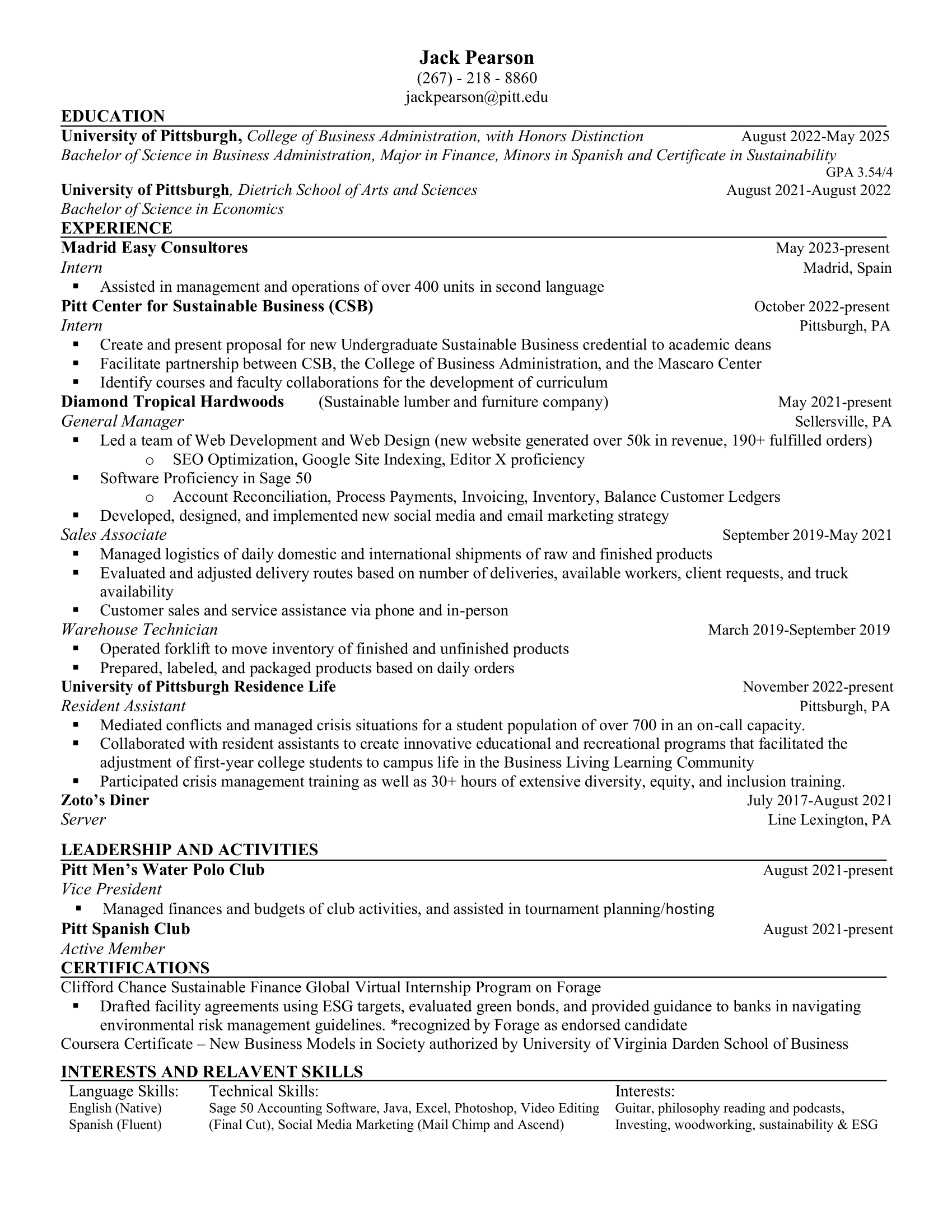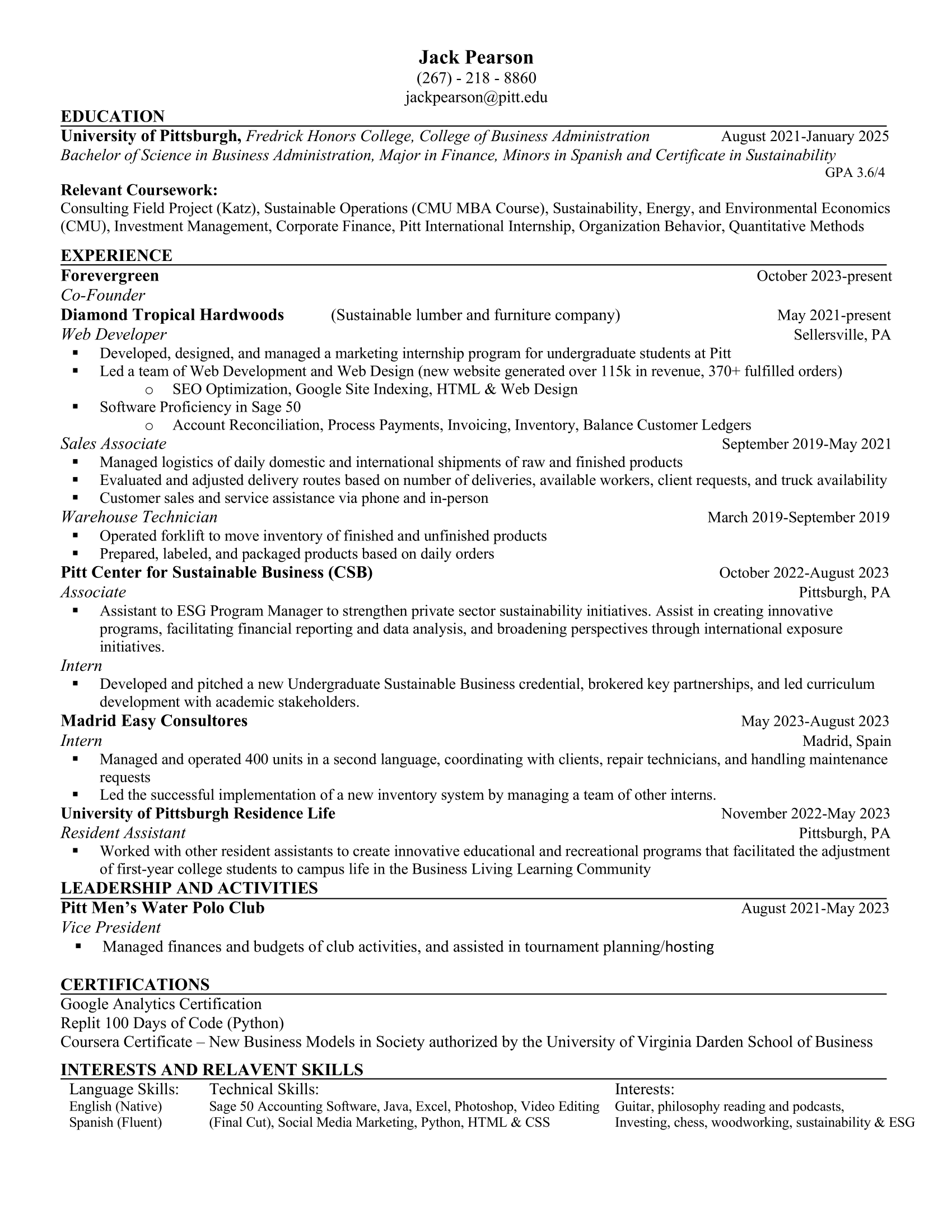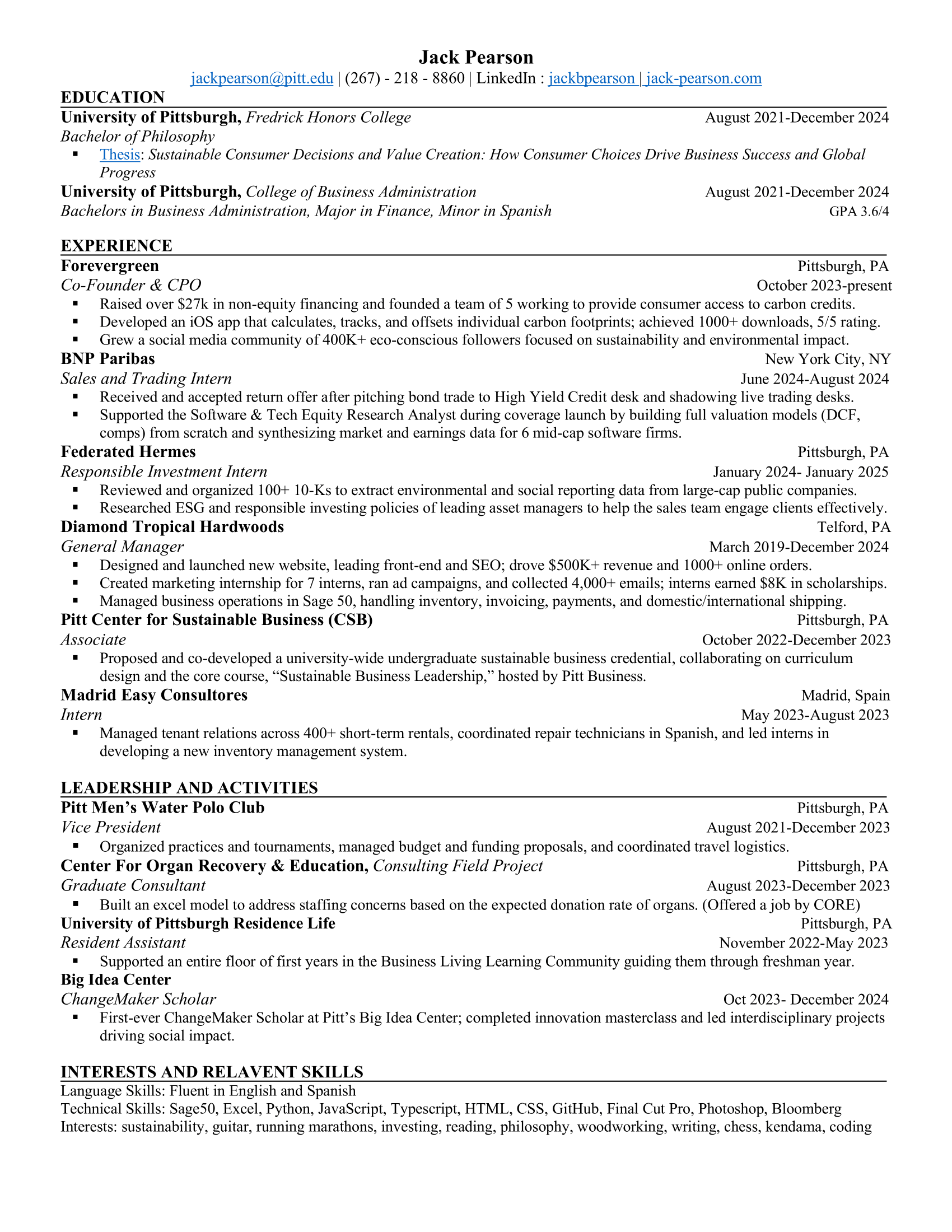How to create a resume to land your dream job
The resume is a living document that encompass your entire professional working history into one page. The amount of effort and detail your put into it is directly correlated to your success in the job market.
My resume allowed me to land a six figure job offer during my junior year of college, get scholarships, and interview at top business schools. In this blog we will break down how to build a resume that improves your chances and will allow you to present your experience in the best way possible.
My Resume Progression
As mentioned above a resume is a living document, which means it needs constant attention and updates to keep up with your professional career. In college I made an effort to update mine almost monthly as my experience was constantly changing. At the bare minimum you should update yours annually. In order to show the progression of my resume I have picked out 4 resumes from the past 4 years. In showing you these documents I hope you can see the amount of progress 1 year can make and you can begin to see the improvements in format, language, experience, and overall quality.
Oct 2022

June 2023

Jan 2024

May 2025

Resume Sections
Depending on your role, industry, and field the sections on your resume might shift. In finance for example it is industry standard to have a 1 page resume. In other fields a longer CV is perfectly acceptable as you may have publications or research to highlight. It is best to do quick Google search and find a template that fits your industry and go from there. If you are in finance, consulting, or any adjacent field you are in luck as my amazing resume template is linked here free to download. (I am biased but I think it is clean)
Education
The education section is the most straightforward and is almost always at the top of any resume. The most import things to include are your institution, major or concentration, and GPA. It may also be useful to include “Relevant Coursework” as some programs might want to see that you have completed required courses. If you notice in mine I have included my honors thesis as it is technically a separate degree on top of my standard BSBA.
Experience
This is where things get a lot more fun. Experience is typically where you want to put all your professional experience, like jobs, internships, startups, etc. The most important thing is to keep your format consistent and clean.
You want to include the follow under each experience:
- •Company Name
- •Location
- •Duration of Employment
- •Most resumes should include the dates in [Month Year] format, it doesn’t really matter just be consistent.
- •For example: May 2024 - August 2024
- •Position
- •If you want to show progression or promotions you can include multiple positions (see my resume from 2023 and 2022)
- •3 Bullet Points
- •It is standard to only have 3 bullet points per experience, the rule of thumb is if you can’t fit everything in 3 bullets you are probably saying too much
Bullet Points
This is the “meat” of your resume, these are where your communicate your impact at each role. They should be optimized to communicate clearly what you did and what the result was of your work. Quantified metrics are appreciated and should be included wherever possible.
Below I have identified two examples of a resume bullet point. See if you can see which one is better and why.
- •Developed an iOS app that calculates, tracks, and offsets individual carbon footprints; achieved 1000+ downloads, 5/5 rating.
- •I coded an app that helps people reduce their environmental impact. Achieved over 1000 downloads and had a perfect 5/5 rating.
So what is wrong in the second one? First, you never want to use I, we know it was you. Second there was no strong “ed” or action verbs. In the first one for example you can see clearly “Developed” this tells you exactly what I did, for example “Coded” is an “ed” word but much less powerful. Experiment with a few different “ed” or action verbs.
Leadership & Activities
The Leadership and Activities section is much like the Experience section just used to highlight other things you might have been involved in. Typical things might be clubs or organizations you were a part of. This should match your Experience section almost exactly the same structure and format.
One thing to note is 3 bullet points might be too many depending on your involvement. My resume is much more experience heavy so I tended to allocate space to that section.
Certifications
This is an optional section to highlight any certification or exams you might have passed. Depending on your industry or job you are applying for it might be required. Again refer to a resume template from your industry to see the standard.
Interests and Relevant Skills
This section is where you can show a little more of your personality. I always liked to have lots of stuff here to show I was more well rounded with some of my other interests or hobbies. It is also important to highlight relevant skills like second languages or other skills that make you a more attractive candidate. I have used the table format with 3 sections but normal bullet points or lines works just as well.
Resume Review
A key component of resume improvement and review is to have it regular checked by someone that has never seen it before. Different people are drawn to different section of the resume, and a new set of eyes is always good as we tend to miss errors after editing the same few lines over and over. If you are in university or school the career center almost 100% has a resume review service for free where you can schedule a time to meet and have someone review your resume.
During my sophomore year I again almost did this monthly and got a lot of great feedback. I would print out 2 copies, have one in front of me and them and go section by section and line by line. As I grew more confident I would go less frequently but still would go to have someone just scan for errors and unclear wording. If you are not in school just send it to a few friends or even just print it out and review yourself. Additionally AI is getting advanced enough that plugging it into something as basic as ChatGPT can give you lots of great pointers and catch errors.
How do I actually build my resume?
This question might be the hardest to answer, formatting and font size are pretty standard but knowing how to build an impressive resume seem be daunting at first. I remember sitting in my intro to business class after I transferred into the business school. I didn’t know what an internship was and didn’t even have a Linkedin, but I knew what I was interested in so I opened up my college website and began to explore. We all have things we want to learn more about so start there, send a quick email asking to learn more or help out and build your confidence and experience. Also in the early stages don’t feel bad about unpaid work, in this competitive market it is totally normal and at times expected that your will volunteer your time for some experience.
I knew I was interested in sustainable business and one day I got an email from the Center for Sustainable Business at Pitt so I immediately replied and ask how I could help out. This became my first internship and quickly built up my confidence to pursue my interests and ask where I could be useful. I was able to land multiple jobs that were not posted online, just by reaching out and networking with the right people. I was able to build a strong resume, one that landed me a solid post grad job where I will continue to build my resume and learn lots of new skills to add as bullet points in the future.
1. Get used to updating your resume regularly
- •You want to get in the habit of constantly updating your resume even if your work experience hasn’t changed.
- •Just changing a few words and cleaning things up will compound over the long term.
2. Get a second opinion
- •Have other people check over things before you send it out.
- •A second set of eyes can see things you glossed over.
- •If you are in college, use resume review resources available to you!
3. Focus on the bullet points
- •The bullets under your experience are the most important lines of text on your resume.
- •These might be the only context a recruiter has on you and your past experience, so make sure they are optimized.
4. Don’t let your resume hold you back
- •The resume is the initial screen before offering an interview, so don’t let it hold you back.
- •It is too easy to control and improve with just a few hours of focus—so do it.
Thanks for reading and I hope you learned something or found this useful!
-Jack
Published on June 13, 2025
Back to Blogs